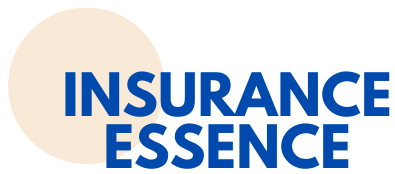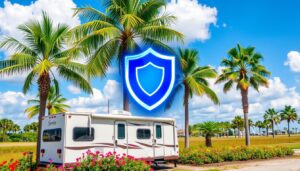As an RV enthusiast, I love hitting the road and exploring Florida. But, it’s important to protect your vehicle. In Florida, RV insurance is not just a luxury. It’s a legal must that keeps you and others safe.
RV insurance is key for RV owners in Florida. It’s not just a law; it’s a way to protect everyone on the road. It covers damage to your RV and liability for accidents. It also protects your personal items and helps with legal costs if you’re in an accident. travel trailer in florida.
Key Takeaways
- Florida requires a minimum of $10,000 for property damage per accident (PD) and $10,000 for personal injury protection (PIP) for RV insurance.
- Lenders typically require comprehensive and collision coverage for financed RVs, even though not mandated by Florida law.
- RV insurance can cover physical damage, liability, personal belongings, and legal costs in an accident.
- If you’re pulling a trailer with a vehicle, you’ll need to insure the vehicle and possibly the trailer itself.
- Understanding the insurance requirements and coverage options is crucial for RV owners in Florida.
What is Motorhome and RV Insurance?
RV insurance is a mix of auto and homeowner’s coverage. It protects your vehicle and the living space inside. It’s a must-have for RV owners, offering peace of mind as you travel.
Comprehensive Coverage Options for Every Traveler
Comprehensive and collision coverage are key parts of RV insurance. They protect your RV from many dangers, like natural disasters and theft. Liability insurance is also crucial, covering you if you damage someone else’s property or hurt them.
You can customize your RV insurance with extra options. These include emergency expenses, roadside assistance, camper liability, and total loss coverage. These options make sure you’re covered, no matter where you go.
| Coverage Type | Description |
|---|---|
| Comprehensive | Protects your RV from non-collision events like fire, theft, or weather-related damage. |
| Collision | Covers repairs or replacement if your RV is involved in a collision with another vehicle or object. |
| Liability | Provides financial protection if you’re responsible for causing damage or injury to others. |
| Emergency Expenses | Reimburses you for additional living expenses if your RV becomes uninhabitable due to a covered loss. |
| Roadside Assistance | Offers help with towing, flat tire changes, jump-starts, and other roadside emergencies. |
| Camper Liability | Covers damage or injuries caused by your camper or trailer when it’s detached from your vehicle. |
| Total Loss Coverage | Provides the full replacement cost of your RV if it’s deemed a total loss after a covered incident. |
With the right RV insurance policy, you can travel with confidence. Your home-away-from-home and all your belongings are safe.
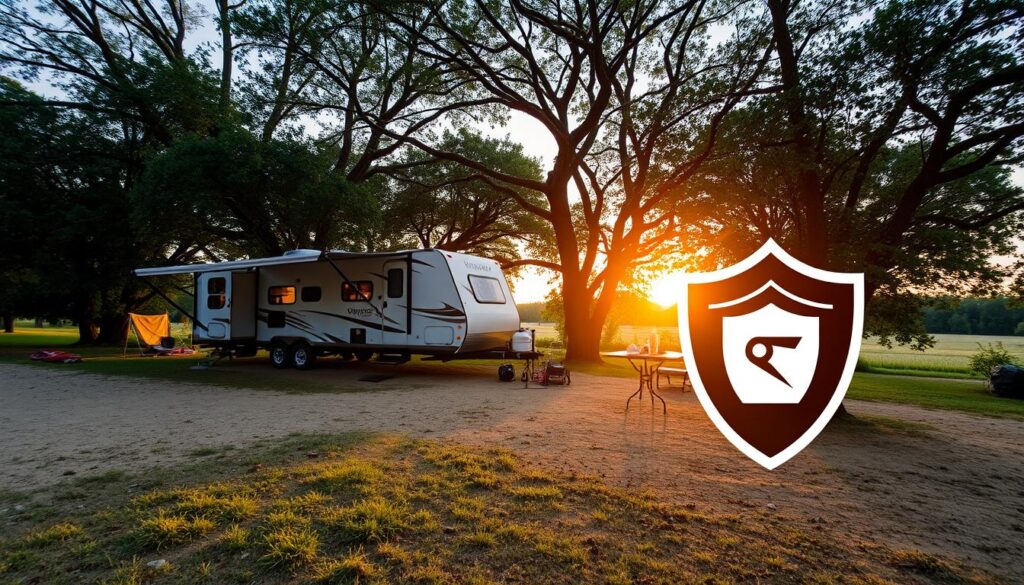
Who Needs Motorhome Insurance?Understanding the Classes of RVs
Motorhome and RV insurance depends on the type of vehicle you have. Each RV class, from Class A motorhomes to Class C models, has its own insurance needs. This is because each class is different in size, features, and use.
Class A motorhomes are big and fancy, needing strong insurance to protect your investment. They require policies that cover both their car and home aspects. This is because they are large and powerful.
Class B motorhomes, or camper vans, need insurance that fits their special setup and risks. They are smaller and easier to move than Class A RVs. So, their insurance needs are different.
Class C motorhomes mix the size of Class A with the ease of Class B. They need insurance that covers both their car and home sides. This is because they offer a good mix of comfort and ease of use.
Towable RVs like fifth-wheel trailers need insurance for road and home use. Toy haulers, horse trailers, pop-up campers, and ATV trailers also have specific insurance needs. This depends on their use and the value of what they carry.
It’s important to have the right insurance for your RV, no matter the class. Knowing what insurance you need helps you make smart choices. This ensures you’re well-protected on the road and at your campsite.
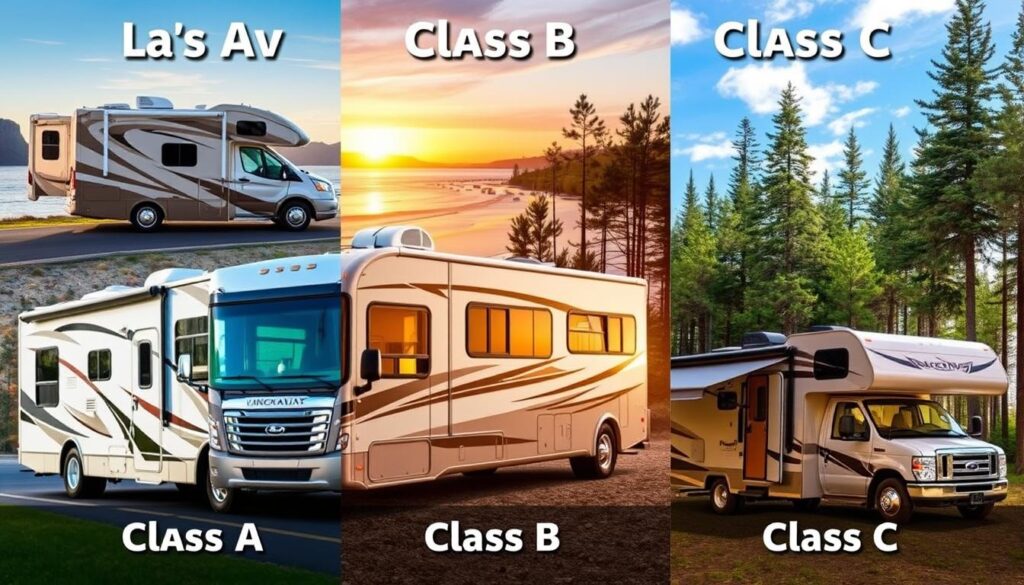
Understanding Florida’s RV Insurance Requirements
If you love RVing in Florida, knowing the state’s insurance rules is key. Florida requires all drivers, including RV owners, to have enough liability coverage. This is to make sure you can pay for damages if you’re in an accident. You need at least $10,000 for personal injury protection (PIP) and $10,000 for property damage liability (PDL).
Florida’s no-fault insurance system helps a lot. Your PIP coverage pays for medical bills for you and your passengers, no matter who caused the crash. This means you and your family are safe on the road, even if something unexpected happens.
While PIP and PDL are must-haves, you might also want to think about extra liability coverage. This includes bodily injury liability. Knowing and following these insurance rules lets you drive your RV with confidence. You’ll know you’re covered and following the law.
Factors Affecting RV Insurance Costs in Florida
How much you pay for RV insurance in Florida depends on a few things. These include the type of RV, what coverage you choose, how often you use it, your driving record, and if you’ve filed any claims. Luckily, there are discounts and savings programs in Florida. These can help you get the right coverage without breaking the bank.
| Insurance Provider | RV Insurance Discount in Florida |
|---|---|
| Good Sam | Up to 53% off premium |
| National General | Full replacement coverage and storage discount |
| Progressive | No storage discount available |
By knowing the insurance rules and discounts in Florida, RV owners can make smart choices. This helps protect their investment and lets them enjoy their travels without worry.
“Ensuring you have the right RV insurance coverage in Florida is essential for your safety and financial security on the road.”
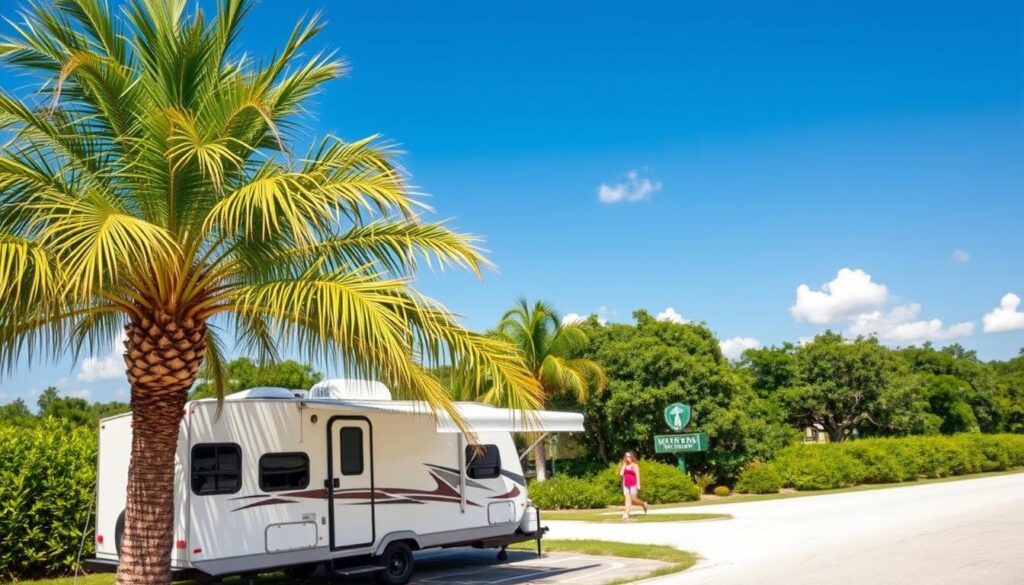
Liability Insurance: A Must-Have for RV Owners
Liability coverage is key for RV owners. It protects you if you cause damage or injury to others while driving your RV. This includes property damage and bodily injury liability. Having the right insurance can protect your assets and meet state requirements.
Minimum Liability Requirements by State
Liability insurance needs vary by state. In Florida, you must have at least $10,000 in property damage liability per accident. This coverage pays for damages to others’ property. Knowing your state’s requirements is crucial, especially when traveling.
Having enough liability coverage is vital for RV owners. It protects you financially and ensures you’re driving legally. Not meeting state requirements can lead to fines and penalties. With liability insurance, you can drive with confidence.
| State | Minimum Property Damage Liability | Minimum Bodily Injury Liability |
|---|---|---|
| Florida | $10,000 per accident | $20,000 per person / $40,000 per accident |
| California | $5,000 per accident | $15,000 per person / $30,000 per accident |
| Texas | $25,000 per accident | $30,000 per person / $60,000 per accident |
Remember, the minimum liability is just the starting point. Based on your RV’s value and the risks you face, you might need more coverage. Talk to your insurance provider to find the best coverage for you.
Do you need insurance on a travel trailer in florida?
Owning a travel trailer in Florida raises questions about insurance. The state doesn’t require travel trailer insurance specifically. Yet, there are key things to remember.
If you got your trailer through a loan, the lender will want you to have trailer insurance. This includes coverage for damage, like if it gets wrecked or stolen. Even if you own it outright, getting insurance is smart to protect your investment.
For do you have to insure a travel trailer in Florida, you must have auto liability insurance. This is true for almost every state, including Florida. It’s needed to cover damages or injuries if you’re in an accident.
So, while do you need insurance on a travel trailer isn’t a must in Florida, it’s a good idea. Comprehensive and collision coverage can help pay for repairs or a new trailer if it’s damaged or stolen. The auto liability coverage on your towing vehicle is also crucial for financial protection.
Whether to insure your travel trailer in Florida is up to you. But, thinking about the risks and what insurance offers makes it a smart choice. Knowing about trailer insurance requirements and options helps you find the best policy. This way, you can enjoy your travels without worry.
Insurance for Full-Time RV Living
If you live in an RV full-time, you might want to think about getting full-time RV insurance. This type of insurance gives you more protection than a regular RV insurance plan. It’s made for people who live in their RVs all the time.
While you don’t have to have it, full-time RV insurance can be very helpful. It can cover you if someone gets hurt in your RV. It also helps pay for damage to shared spaces in your RV community.
Full-time RV insurance includes things like personal liability and medical payments. These are important if you live in your RV all the time. They help you feel safer and more secure on the road.
| Coverage | Description |
|---|---|
| Full-Timer’s Liability | Covers you if you’re held responsible for injuries in or near your RV |
| Loss Assessment | Pays for fees charged by your RV association for damage to shared areas |
| Personal Liability | Protects you if you’re sued for injuries or property damage to others |
| Medical Payments | Covers medical expenses for you and your passengers if injured in an accident |
| Personal Property | Protects your belongings inside the RV from theft, damage, or loss |
Whether you love living in an RV full-time or are thinking about it, getting the right insurance is key. Knowing what full-time RV insurance offers can help protect your life on the road.
“Living in an RV full-time is an adventure, but it also requires specialized insurance to safeguard your home and lifestyle. Full-time RV insurance provides the comprehensive coverage you need to feel secure on the road.”
Factors Affecting RV Insurance Costs
The cost of insuring your RV can change a lot based on several key factors. Knowing how these factors affect your RV insurance can help you save money. It’s important to understand these elements to make smart choices.
Type of RV
The size and class of your motorhome affect your insurance rates. Big, expensive Class A motorhomes cost more to insure than smaller Class B or C models. Towable RVs like travel trailers and fifth-wheels usually have lower insurance costs than motorhomes.
Usage
How often and where you use your RV can change your insurance costs. Full-time RVers who live in their vehicles all year pay more than those who use theirs for weekend trips or vacations.
Driving History
Your driving record is very important for setting your RV insurance rates. Safe drivers can get lower premiums. Drivers with accidents or tickets may pay more.
Location
Where you store and use your RV can also affect insurance rates. Areas with more accidents or thefts may have higher RV insurance costs than safer places.
Coverage Options
The coverage you choose for your RV insurance can greatly impact costs. Higher coverage levels or extra protections like roadside assistance will usually mean higher premiums.
Understanding these factors can help RV owners plan for insurance costs. This way, they can make choices that fit their budget and coverage needs.
| RV Type | Average Annual Insurance Cost |
|---|---|
| Travel Trailer | $200 – $600 |
| Class A Motorhome | $600 – $2,500 |
| Class B Motorhome | $300 – $1,000 |
| Class C Motorhome | $600 – $1,000 |
Importance of Adequate RV Insurance Coverage
As an RV owner in Florida, it’s key to have the right insurance. The state might only ask for a minimum, but getting more can really help. It gives you peace of mind and protects your wallet while you travel.
RV insurance has many benefits that protect your investment and handle risks on the road. It covers theft, vandalism, and damage from weather. It also helps if you’re in an accident. A good RV insurance policy lets you enjoy the RV life without worry.
With comprehensive and collision coverage, plus extras like emergency help and roadside service, you’re covered. Adequate RV insurance lets you enjoy your trips without worrying about money.
| RV Insurance Benefits | Coverage Options |
|---|---|
| Theft and Vandalism Protection | Comprehensive Coverage |
| Liability Coverage | Liability Insurance |
| Weather and Damage Protection | Collision Coverage |
| Emergency Expenses and Roadside Assistance | Specialized Coverages |
Getting comprehensive RV insurance is smart for Florida RV owners. It lets you hit the road knowing your investment and adventures are safe.
“Adequate RV insurance coverage is essential for RV owners to have the financial security and confidence to explore the open road without worry.”
Insuring Additional Equipment and Accessories
Protecting your RV’s extra gear and accessories is as crucial as insuring the RV itself. RV accessories insurance and RV add-on coverage safeguard the special parts and personal items that make your RV experience better.
Most RV insurance policies cover insuring RV equipment and RV personal property. This includes things like electronics, appliances, and other valuable items inside your RV. This RV contents insurance ensures your investment is safe from theft, fire, or natural disasters.
Many RV insurance providers also offer extra coverages for insuring RV accessories and custom parts. This includes awnings, generators, satellite dishes, or even custom paint jobs. Adding these RV add-on coverage options means your RV is fully protected, no matter how you’ve customized it.
| Coverage | Description | Key Benefits |
|---|---|---|
| RV Personal Property Coverage | Covers the personal belongings inside your RV, including electronics, jewelry, and other valuables. | Protects your investment in personal items, providing reimbursement in the event of a covered loss. |
| RV Accessories Coverage | Covers the cost to repair or replace custom parts, equipment, and accessories added to your RV. | Ensures your RV’s specialized features are protected, preserving your investment. |
| RV Contents Insurance | Provides coverage for the personal belongings and contents stored inside your RV. | Offers comprehensive protection for your valuables, giving you peace of mind while on the road. |
By exploring these extra coverage options, you can make sure your RV is safe inside and out. This lets you enjoy the journey without any worries.
Specialized Coverages for Peace of Mind
As a savvy RV owner, you know how important it is to tailor your insurance. There are many RV specialized coverages to give you the protection you need.
Emergency Expenses Coverage
Imagine being far from home and your RV breaks down. Emergency Expenses Coverage helps with the costs of lodging and travel. It’s there to support you when you’re away from home.
Roadside Assistance
Roadside Assistance gives you peace of mind with 24-hour support. It covers towing, flat tire changes, and more. This coverage lets you enjoy your trip without worrying about mechanical issues.
Camper Liability
When your RV is parked, Camper Liability keeps you protected. It adds an extra layer of security. You’re covered in case of an unexpected event.
Total Loss Coverage
If your RV is a total loss, Total Loss Coverage has your back. It ensures you get the original purchase price for a new RV. This way, you can get back on the road without financial worries.
These RV insurance add-ons and additional RV coverages are made for your adventures. They make sure your insurance is ready for anything. This way, you can enjoy your travels with less stress and more peace of mind.
Choosing the Right RV Insurance Provider
Finding the right RV insurance can seem hard. But it’s key to protect your recreational vehicle. Whether you use it for trips or live in it full-time, knowing your options is crucial.
Many top RV insurance providers are out there. Progressive, Good Sam, and Geico are leaders, says MarketWatch Guides Team. Allstate is great for those who live in their RVs, offering lots of coverage and discounts.
Some RV insurance providers also have special coverages. You can get vacation liability, pet injury protection, and full-timer liability insurance. These extras can give you peace of mind and protect your finances, especially if your RV is your home.
| RV Insurance Provider | Key Strengths | Average Annual Cost |
|---|---|---|
| Progressive | Best overall for pricing, coverage options, and customer service | $1,200 |
| Nationwide | Best for full-time RV living, with extensive coverage tailored for primary residence use | $1,800 |
| State Farm | Leverages its nationwide network of local insurance agents to provide quality RV coverage | $1,500 |
When looking at RV insurance quotes, think about your driving history, RV value, how you use it, and where you live. By comparing different RV insurance providers, you can find the best fit for you.
At Peoples First Insurance, we get what RV owners need. We’re here to help you find the right RV insurance. Contact us to talk about your needs and get a quote that fits your budget.
Conclusion
RV insurance is key for anyone with a recreational vehicle in Florida. It’s not just a law; it’s a must for your safety and others on the road. Knowing about RV insurance requirements and coverage options helps you get the right policy.
Whether you use your RV all the time or just on weekends, getting the right insurance matters. It protects your investment and makes your trips worry-free. By understanding RV insurance, you can enjoy your travels more.
RV insurance is more than a law; it’s a way to keep your investment safe. Choosing the right policy lets you travel Florida’s roads with confidence. You’ll know you’re covered.
FAQ
Do you need insurance on a travel trailer in Florida?
What is RV insurance and what does it cover?
Who needs motorhome insurance?
What are the RV insurance requirements in Florida?
Why is liability coverage important for RV owners?
Do you need insurance on a travel trailer in Florida?
What is full-time RV insurance?
What factors affect the cost of RV insurance?
Why is adequate RV insurance coverage important?
Do I need to insure additional equipment and accessories on my RV?
What specialized coverages are available for RV owners?
How can I choose the right RV insurance provider?
Source Links
- What Are Florida’s RV Insurance Requirements? – Levay Mack Insurance Group – https://www.levaymack.com/what-are-floridas-rv-insurance-requirements/
- Florida RV & Motorhome Insurance | Peoples First Insurance – https://pfinsurance.com/productsservices/personal-insurance/rv-motorhome-insurance/
- Do I Need RV Insurance? – https://www.progressive.com/answers/do-i-need-rv-insurance/
- RV and Motorhome Insurance Quotes & Rates – https://www.usaa.com/insurance/vehicles/rv-motorhome/
- A Comprehensive Overview of RV Licensing by State – https://www.lazydays.com/rv-lifestyle/ultimate-guide-rv-registration-and-state-compliance
- 5 essential things to know about RV insurance – Guided Solutions – https://guidedsolutions.com/5-essential-things-to-know-about-rv-insurance/
- Cost of RV Insurance – https://www.marketwatch.com/guides/insurance-services/cost-of-rv-insurance/
- Florida RV Insurance: 3 Top Providers – https://lendedu.com/blog/florida-rv-insurance/
- RV Insurance – State Insurance USA – Get quote now! – https://stateinsuranceusa.com/personal-insurance/rv-insurance/
- RV Rental Insurance – https://www.progressive.com/answers/rv-rental-insurance/
- Allstate – https://www.marketwatch.com/guides/insurance-services/allstate-rv-insurance/
- RV Insurance – Get a Free Quote Today – https://www.geico.com/rv-insurance/
- Riding risk: Navigating the legal and safety challenges of Florida’s pedal pubs – https://www.foryourrights.com/blog/florida-trailer-towing-laws/
- How Much Does RV Insurance Cost? (2024 Prices) – https://homeguide.com/costs/rv-insurance-cost
- 10 things you need to know to insure your RV – https://www.transwest.com/rv/blog/10-things-you-need-to-know-to-insure-your-rv/
- State Farm – https://www.marketwatch.com/guides/insurance-services/state-farm-rv-insurance/
- 7 Best RV Insurance Companies of October 2024 – https://money.com/best-rv-insurance/
- What are the different types of insurance? – https://www.statefarm.com/simple-insights/residence/what-are-all-the-different-types-of-insurance
- Recreational Vehicle Insurance | David Dunham Insurance – https://www.daviddunhamins.com/personal/recreational-vehicle-insurance/
- Best RV Insurance – https://www.marketwatch.com/guides/insurance-services/best-rv-insurance/
- Geico – https://www.marketwatch.com/guides/insurance-services/geico-rv-insurance/
- What States Require Trailer Insurance – EducationalWave – https://www.educationalwave.com/what-states-require-trailer-insurance/
- Do I Need Travel Trailer Insurance In The USA? – Travel Spy – https://www.travelspy.org/do-i-need-travel-trailer-insurance-in-the-usa/
